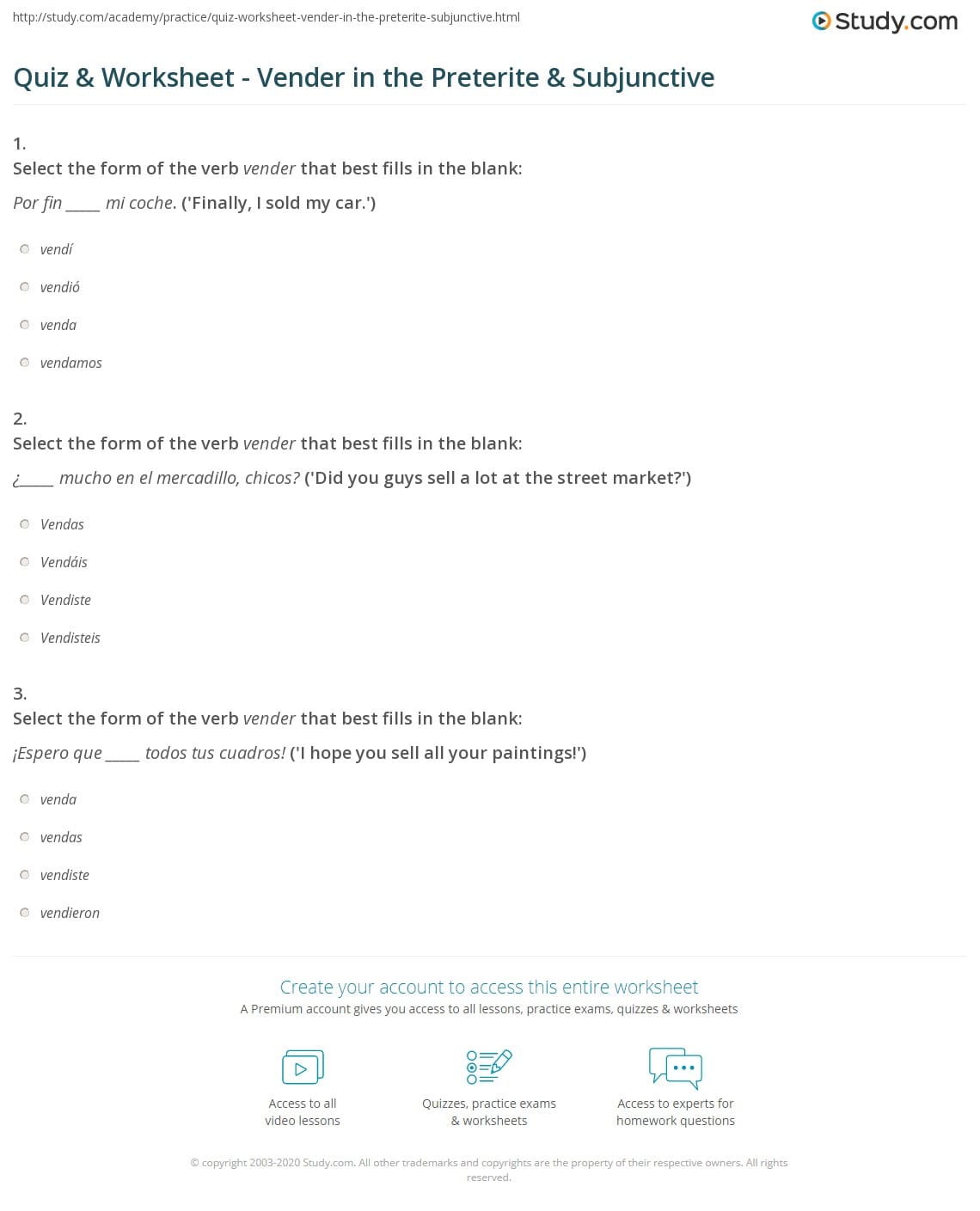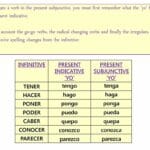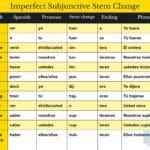¡Hola! I’m María Magdalena Haid, and I’m thrilled to guide you through the world of vender conjugation. Whether you’re haggling in a bustling marketplace or simply describing what someone does for a living, mastering this verb is essential for effective communication in Spanish. This guide, presented by SpanishPod101, will equip you with the knowledge and practical tools to use vender confidently in any situation.
Present Tense: Talking About What’s Happening Now
The present tense is your go-to for discussing actions happening right now or habitually. Let’s break down the conjugation of vender in the present tense:
| Pronoun | Vender Conjugation | Example |
|---|---|---|
| yo | vendo | Yo vendo frutas. (I sell fruit.) |
| tú | vendes | Tú vendes coches. (You sell cars.) |
| él/ella/usted | vende | Él/Ella/Usted vende casas. (He/She/You sell houses.) |
| nosotros/as | vendemos | Nosotros vendemos ropa. (We sell clothes.) |
| vosotros/as | vendéis | Vosotros vendéis libros. (You all sell books – Spain) |
| ellos/as/ustedes | venden | Ellos/Ellas/Ustedes venden zapatos. (They/You all sell shoes.) |
Tip: Notice how vender, like other regular -er verbs, follows a predictable pattern. Once you grasp this pattern, you’ll be able to conjugate a whole family of -er verbs with ease! If you’re ready to tackle another common verb, check out our guide on Volar Conjugation.
Past Tense (Preterite): Talking About Completed Actions
The preterite tense describes actions completed in the past. It’s like taking a snapshot of a finished action. Here’s how vender conjugates in the preterite:
| Pronoun | Vender Conjugation | Example |
|---|---|---|
| yo | vendí | Yo vendí mi bicicleta. (I sold my bike.) |
| tú | vendiste | Tú vendiste tu casa. (You sold your house.) |
| él/ella/usted | vendió | Él/Ella/Usted vendió su coche. (He/She/You sold his/her/your car.) |
| nosotros/as | vendimos | Nosotros vendimos nuestros muebles. (We sold our furniture.) |
| vosotros/as | vendisteis | Vosotros vendisteis vuestros libros. (You all sold your books – Spain.) |
| ellos/as/ustedes | vendieron | Ellos/Ellas/Ustedes vendieron sus zapatos. (They/You all sold their shoes.) |
Common Mistake: Be mindful of the accent mark in the yo form (vendí). This distinguishes it from the present tense form (vendo).
Imperfect Tense: Describing Past Habits and Ongoing Actions
The imperfect tense paints a picture of ongoing or habitual actions in the past. Think of it like a video of an action in progress. Here’s how vender conjugates in the imperfect:
| Pronoun | Vender Conjugation | Example |
|---|---|---|
| yo | vendía | Yo vendía flores cada domingo. (I used to sell flowers every Sunday.) |
| tú | vendías | Tú vendías periódicos después de la escuela. (You used to sell newspapers after school.) |
| él/ella/usted | vendía | Él/Ella/Usted vendía artesanías en la plaza. (He/She/You used to sell crafts in the square.) |
| nosotros/as | vendíamos | Nosotros vendíamos limonada en el verano. (We used to sell lemonade in the summer.) |
| vosotros/as | vendíais | Vosotros vendíais entradas para el cine. (You all used to sell movie tickets – Spain.) |
| ellos/as/ustedes | vendían | Ellos/Ellas/Ustedes vendían dulces en la calle. (They/You all used to sell candy on the street.) |
For a deeper dive into another past tense, explore our guide on Volver Preterite.
Future Tense: Talking About What Will Happen
The future tense, as its name suggests, expresses actions that will occur in the future. Here’s the future tense conjugation for vender:
| Pronoun | Vender Conjugation | Example |
|---|---|---|
| yo | venderé | Yo venderé mi coche el año que viene. (I will sell my car next year.) |
| tú | venderás | Tú venderás tu casa pronto. (You will sell your house soon.) |
| él/ella/usted | venderá | Él/Ella/Usted venderá sus propiedades. (He/She/You will sell his/her/your properties.) |
| nosotros/as | venderemos | Nosotros venderemos nuestros productos en línea. (We will sell our products online.) |
| vosotros/as | venderéis | Vosotros venderéis vuestras creaciones. (You all will sell your creations. – Spain) |
| ellos/as/ustedes | venderán | Ellos/Ellas/Ustedes venderán sus acciones. (They/You all will sell their shares.) |
Conditional Tense: Expressing Hypothetical Situations
The conditional tense is used to express actions that would happen under certain conditions. Here’s the conditional tense conjugation for vender:
| Pronoun | Vender Conjugation | Example |
|---|---|---|
| yo | vendería | Yo vendería mi casa si tuviera una oferta mejor. (I would sell my house if I had a better offer.) |
| tú | venderías | Tú venderías tu coche si necesitaras el dinero. (You would sell your car if you needed the money.) |
| él/ella/usted | vendería | Él/Ella/Usted vendería su negocio si fuera rentable. (He/She/You would sell his/her/your business if it were profitable.) |
| nosotros/as | venderíamos | Nosotros venderíamos nuestras acciones si el mercado bajara. (We would sell our shares if the market went down.) |
| vosotros/as | venderíais | Vosotros venderíais vuestros boletos si no pudierais ir al concierto. (You all would sell your tickets if you couldn’t go to the concert. – Spain) |
| ellos/as/ustedes | venderían | Ellos/Ellas/Ustedes venderían sus propiedades si se mudaran al extranjero. (They/You all would sell their properties if they moved abroad.) |
Subjunctive Mood: Expressing Subjectivity and Uncertainty
The subjunctive mood is used to express desires, doubts, emotions, and possibilities. It often follows verbs like querer (to want), necesitar (to need), esperar (to hope), and dudar (to doubt). Exploring the subjunctive is crucial for more advanced Spanish conversation. While the full scope of the subjunctive is beyond the focus of this guide on vender, it’s an important aspect of verb conjugation to explore as you progress in your Spanish studies. Specialized resources and textbooks can provide a more in-depth exploration of this grammatical concept.
Putting it all Together
Mastering vender conjugation involves consistent practice and application. By focusing on the core tenses – present, preterite, imperfect, and future – you’ll develop a solid foundation. As you progress, delve into the conditional, subjunctive and other moods to refine your fluency. Don’t shy away from real-world conversations. The more you use these conjugations in context, the more natural they will become. ¡Buena suerte! (Good luck!)
















